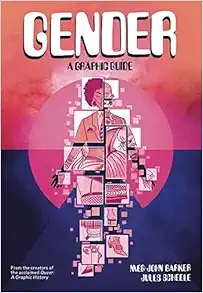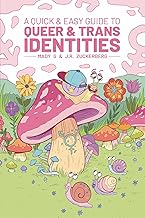

 Gender: a Graphic Guide
by
Meg-John Barker; Jules Scheele (Illustrator);
Gender: a Graphic Guide
by
Meg-John Barker; Jules Scheele (Illustrator);
 Out North
by
Nisha Eswaran; Craig Jennex
Out North
by
Nisha Eswaran; Craig Jennex
 Our Work Is Everywhere
by
Leah Lakshmi Piepzna-Samarasinha
Our Work Is Everywhere
by
Leah Lakshmi Piepzna-Samarasinha
 Queer: a Graphic History
by
Meg-John Barker; Julia Scheele (Illustrator); Jules Scheele (Illustrator)
Queer: a Graphic History
by
Meg-John Barker; Julia Scheele (Illustrator); Jules Scheele (Illustrator)
 Rainbow Reflections
by
Stephanie Gauvin (Editor); Phillip Joy (Editor); Matthew Lee (Editor)
Rainbow Reflections
by
Stephanie Gauvin (Editor); Phillip Joy (Editor); Matthew Lee (Editor)
 A Quick and Easy Guide to Queer and Trans Identities
by
Mady G.; J. R. Zuckerberg (Illustrator)
A Quick and Easy Guide to Queer and Trans Identities
by
Mady G.; J. R. Zuckerberg (Illustrator)
 Queer Embodiment
by
Hil Malatino
Queer Embodiment
by
Hil Malatino
 The Everyday Lives of Gay Men
by
Jason Holmes; Edgar Rodríguez-Dorans
The Everyday Lives of Gay Men
by
Jason Holmes; Edgar Rodríguez-Dorans
 Pocket Guide for Understanding LGBTQ Mental Health
by
Petros Levounis (Editor); Eric Yarbrough (Editor)
Pocket Guide for Understanding LGBTQ Mental Health
by
Petros Levounis (Editor); Eric Yarbrough (Editor)